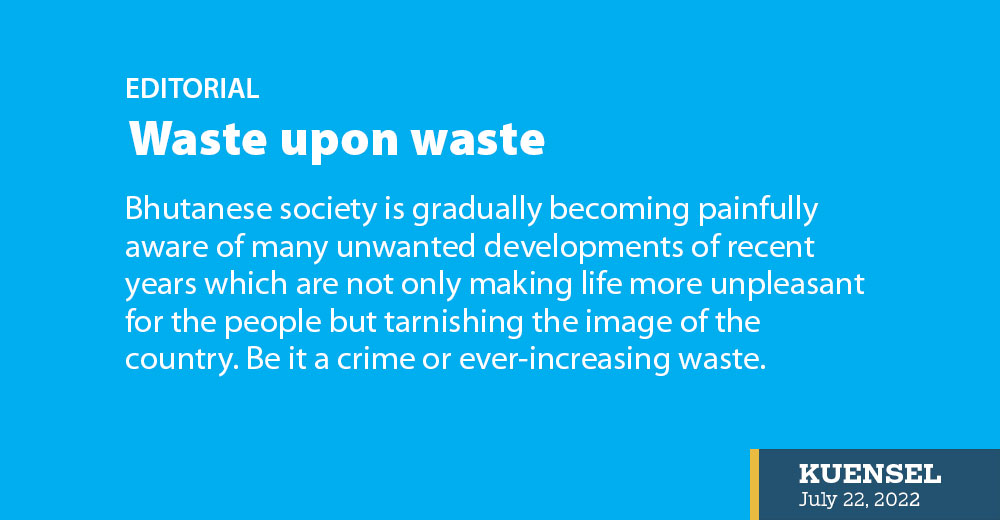Bhutanese society is gradually becoming painfully aware of many unwanted developments of recent years which are not only making life more unpleasant for the people but tarnishing the image of the country. Be it a crime or ever-increasing waste.
De-suups yesterday collected more than 95 bags of waste on a short stretch between Welcome Gate and Memelakha in Thimphu.
Numerous measures have been put in place to curb littering but they are yet to create an impact. The drop-in centres outside the thromde are overflowing most of the time and emit a strong stench.
Issues with waste collection trucks irk residents who dump their household waste at night by the roadside or in streams. Residents in Phuentsholing thromde and Paro or major thromdes are frustrated with similar issues.
The issues are not limited to major towns. For instance, Mongar dzongkhag tshogdu discussed at length during its recent session two days ago how to resolve the issue of mounting waste issues in the gewogs. While a few gewogs have a landfill, the waste doesn’t even reach there. The amount of litter is growing by the day.
Bhutan’s pristine environment, so pure that it was taken for granted in the past, is now being polluted. The rivers see all kinds of waste matter thrown in, including discarded oil from workshops and garages, the mountainsides are being littered with non-degradable waste like plastics and cans, and the air itself is getting heavier with more fumes.
The burden on the landfills is also worsening. One of the major problems with landfills is that the toxic liquids seep into the earth and poison the underground water and ecosystem.
Not long ago, we blamed the littering in most spots on regional tourists. We have not had regional tourists visiting for a long time now. But we still have many areas littered with all sorts of waste. What then is the problem?
It seems fixing small things like the timing of waste collection or offering more eco-friendly alternatives could help us in a big way. For example, locally made eco-friendly products such as plates, cups, and cloth shopping bags will reduce a lot of the waste going to landfills. We need to subsidise such products.
The long-term solution – we know – is education. The population must be taught the value of recycling or the proper disposal of all waste, especially the non-bio-degradable.
But an effective educational programme must be truly long-term and intensive. For a start, the short spurts of campaign activity could be replaced by full-fledged and regular instruction of all sections of the population at meetings and gatherings in both the urban and rural areas. Schools must have continuous lessons since students are the core of future society.
At the same time, similar experiences in many Asian countries indicate that such a programme cannot be implemented without some discipline. If it is an example worth studying, Singapore could not have developed its reputation for being one of the cleanest cities in the world without the participation of a tough police force. Neither could many others.


